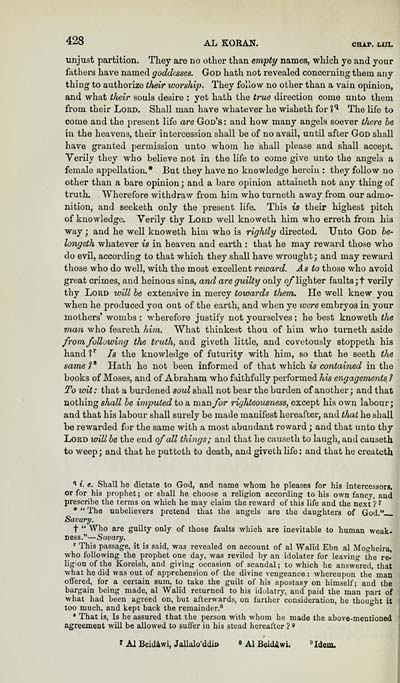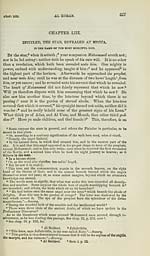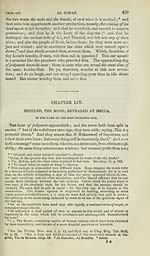Download files
Complete book:
Individual page:
Thumbnail gallery: Grid view | List view

428 AL KORAN. CHAP, luu
imjust partition. They are no other than empty names, which ye and your
fathers have named goddesses. God hath not revealed concerning them any
thing to authorize their worship. They follow no other than a vain opinion,
and what their souls desire : yet hath the true direction come unto them
from their Lord. Shall man have whatever he wisheth for]** The Life to
come and the present life are God's: and how many angels soever there he
in the heavens, their intercession shall be of no avail, until after God shall
have granted permission unto whom he shall please and shall accept.
"Verily they who believe not in the life to come give unto the angels a
female appellation.* But they have no knowledge herein : they follow no
other than a bare opinion ; and a bare opinion attaiueth not any thing of
truth. Wherefore withdraw fi-om him who turneth away from our admo-
nition, and seeketh only the present life. This is their highest pitch
of knowledge. Verily thy Lord well knoweth him who erreth from his
way ; and he well knoweth hiai who is righdy directed. Unto God be-
longeth whatever is in heaven and earth : that he may reward those who
do evil, according to that which they shall have wrought; and may reward
those who do well, with the most excellent reward. As to those who avoid
great crimes, and heinous sins, and are guilty only o/"lighter faults jt verily
thy Lord will he extensive in mercy towards them. He well knew you
when he produced you out of the earth, and when ye were embryos in your
mothers' wombs : wherefore justify not yourselves : he best knoweth the
man who feareth 1dm. "What thinkest thou of him who turneth aside
from following the truth, and giveth little, and covetously stoppeth his
hand?*" Is the knowledge of futurity with him, so that he seeth the
same ?' Hath he not been informed of that which is contained in the
books of Moses, and of Abraham who faithfully performed his engagements ?
To unt: that a bui'dened soul shall not bear the burden of another ; and that
nothing shall he imputed to a manybr righteousness, except his own labour;
and that his labour shall surely be made manifest hereafter, and that he shall
be rewarded for the same with a most abundant reward ; and that unto thy
Lord will he the end of all things; and that he causeth to laugh, and causeth
to weep; and that he putteth to death, and givelh life : and that he createth
1 1. e. Shall he dictate to God, and name whom he pleases for his intercessors,
or for his prophet; or shall he choose a religion according to his own fancy, and
prescribe the terms on which he may claim the reward of this life and the next ? ^
" " The unbelievers pretend that the angels are the daughters of God."
t " Who are guilty only of those faults which are inevitable to human weak-
ness." — Savary.
' This passage, it is said, was revealed on account of al Walid Ebn al Mogheira,
who following the prophet one day, was reviled by an idolater for leaving The re.'
ligionof the Koreish, and giving occasion of scandal; to which he answered, that
what he did was out of apprehension of the divine vengeance: whereupon the' man
offered, for a certain sum, to take the guilt of his apostasy on himself; and the
bargain being made, al Walid returned to his idolatry, and paid the man part of ;
what had been agreed on, but afterwards, on farther consideration, he thought i'
too much, and iiept back the remainder.^
• That is, Is he assured that the person with whom he made the above-mentioned
agreement will be allowed to suffer in his stead hereafter ? »
' Al Beidawi, Jallalo'ddlD 8 ^.1 Beid4wi. ®Idem.
imjust partition. They are no other than empty names, which ye and your
fathers have named goddesses. God hath not revealed concerning them any
thing to authorize their worship. They follow no other than a vain opinion,
and what their souls desire : yet hath the true direction come unto them
from their Lord. Shall man have whatever he wisheth for]** The Life to
come and the present life are God's: and how many angels soever there he
in the heavens, their intercession shall be of no avail, until after God shall
have granted permission unto whom he shall please and shall accept.
"Verily they who believe not in the life to come give unto the angels a
female appellation.* But they have no knowledge herein : they follow no
other than a bare opinion ; and a bare opinion attaiueth not any thing of
truth. Wherefore withdraw fi-om him who turneth away from our admo-
nition, and seeketh only the present life. This is their highest pitch
of knowledge. Verily thy Lord well knoweth him who erreth from his
way ; and he well knoweth hiai who is righdy directed. Unto God be-
longeth whatever is in heaven and earth : that he may reward those who
do evil, according to that which they shall have wrought; and may reward
those who do well, with the most excellent reward. As to those who avoid
great crimes, and heinous sins, and are guilty only o/"lighter faults jt verily
thy Lord will he extensive in mercy towards them. He well knew you
when he produced you out of the earth, and when ye were embryos in your
mothers' wombs : wherefore justify not yourselves : he best knoweth the
man who feareth 1dm. "What thinkest thou of him who turneth aside
from following the truth, and giveth little, and covetously stoppeth his
hand?*" Is the knowledge of futurity with him, so that he seeth the
same ?' Hath he not been informed of that which is contained in the
books of Moses, and of Abraham who faithfully performed his engagements ?
To unt: that a bui'dened soul shall not bear the burden of another ; and that
nothing shall he imputed to a manybr righteousness, except his own labour;
and that his labour shall surely be made manifest hereafter, and that he shall
be rewarded for the same with a most abundant reward ; and that unto thy
Lord will he the end of all things; and that he causeth to laugh, and causeth
to weep; and that he putteth to death, and givelh life : and that he createth
1 1. e. Shall he dictate to God, and name whom he pleases for his intercessors,
or for his prophet; or shall he choose a religion according to his own fancy, and
prescribe the terms on which he may claim the reward of this life and the next ? ^
" " The unbelievers pretend that the angels are the daughters of God."
t " Who are guilty only of those faults which are inevitable to human weak-
ness." — Savary.
' This passage, it is said, was revealed on account of al Walid Ebn al Mogheira,
who following the prophet one day, was reviled by an idolater for leaving The re.'
ligionof the Koreish, and giving occasion of scandal; to which he answered, that
what he did was out of apprehension of the divine vengeance: whereupon the' man
offered, for a certain sum, to take the guilt of his apostasy on himself; and the
bargain being made, al Walid returned to his idolatry, and paid the man part of ;
what had been agreed on, but afterwards, on farther consideration, he thought i'
too much, and iiept back the remainder.^
• That is, Is he assured that the person with whom he made the above-mentioned
agreement will be allowed to suffer in his stead hereafter ? »
' Al Beidawi, Jallalo'ddlD 8 ^.1 Beid4wi. ®Idem.
Set display mode to: Large image | Transcription
Images and transcriptions on this page, including medium image downloads, may be used under the Creative Commons Attribution 4.0 International Licence unless otherwise stated. ![]()
| Early Gaelic Book Collections > J. F. Campbell Collection > Koran: or, Alcoran of Mohammed > (582) |
|---|
| Permanent URL | https://digital.nls.uk/77140497 |
|---|
| Description | Volumes from a collection of 610 books rich in Highland folklore, Ossianic literature and other Celtic subjects. Many of the books annotated by John Francis Campbell of Islay, who assembled the collection. |
|---|
| Description | Selected items from five 'Special and Named Printed Collections'. Includes books in Gaelic and other Celtic languages, works about the Gaels, their languages, literature, culture and history. |
|---|

